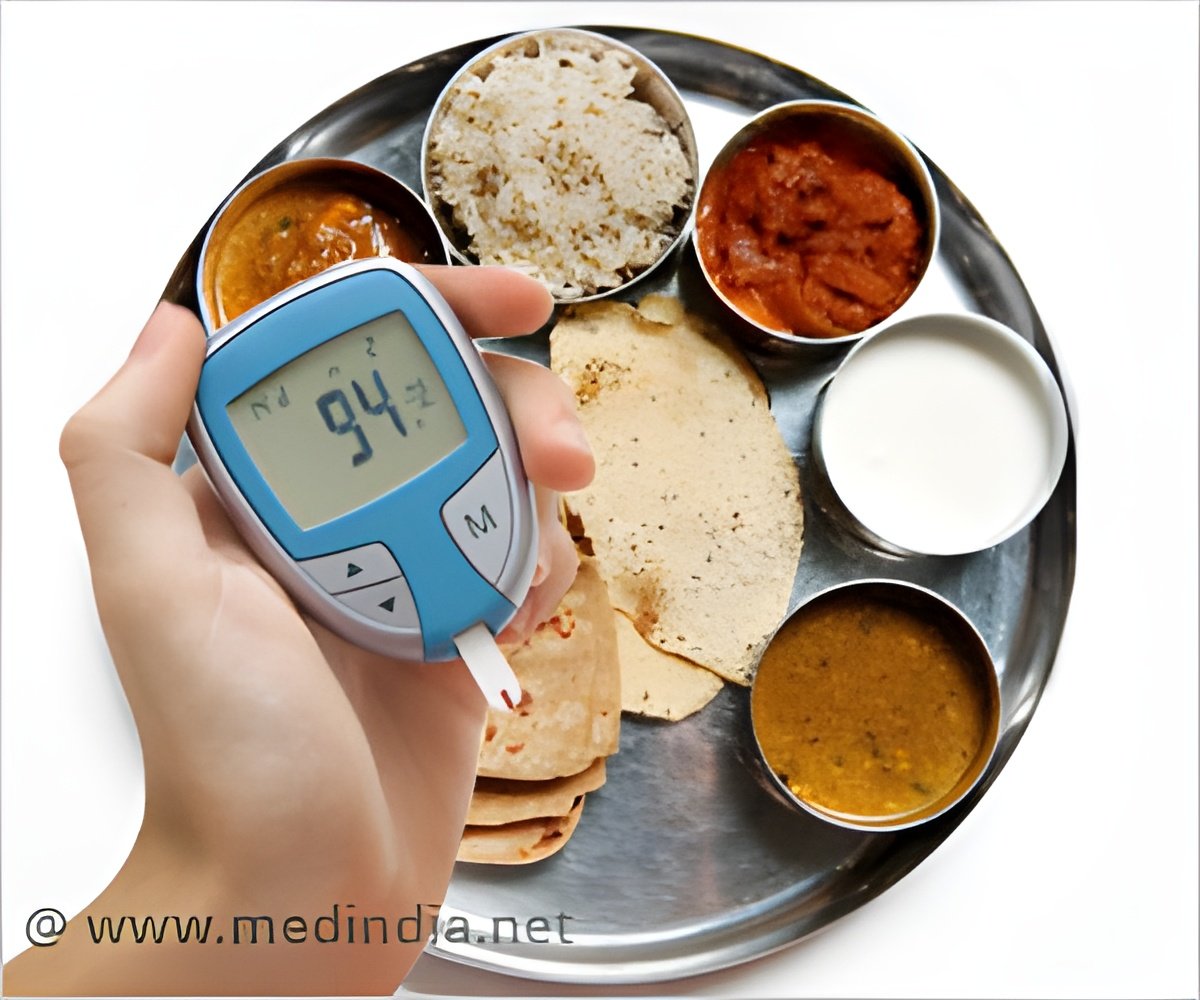Seven out of 10 diabetics in India fail to pay attention to healthy diet and Indians must get diet advice based on country-specific food,says a new survey.

Key findings from the survey:
- About 62% of individuals with diabetes are overweight or obese with a BMI reading more than 22.9. About 46% of individuals with diabetes are obese. Men had an average BMI value of 24.1, which puts them in overweight category and women had an average BMI of 25.3, indicating obesity.
- About 55% people diagnosed with diabetes were below age 45 years, and about 17% were diagnosed at an age less than 35 years.
- About 65% have uncontrolled blood sugar levels. Blood sugars are also seen to be influenced by the type of food that is eaten and the time at which it is consumed.
- About 62% experience other medical conditions. High blood pressure or hypertension (40%) comes out as the most common co-morbidity. Almost 70% of people having diabetes for more than five years reported one or more co-morbidity. Neuropathy - dysfunction of one or more peripheral nerves, retinopathy - disease of the retina that results in impairment of vision are relatively high in this group.
- About 40% of people do not undergo diabetes monitoring tests properly.
Dr. V Mohan, Chairman of Dr. Mohan's Diabetes Specialties Center, Chennai says, "Testing of both fasting and post-meal blood sugars are important because the fasting blood sugar tells us about the liver's glucose production while the post-meal blood sugar tells us about the glucose disposal. Controlling both of these is therefore important. However, the post–meal is even more important because the post- meal blood sugars have been linked to cardiovascular disease in many studies.
Shashank Joshi, President of Indian Academy of Diabetes and Senior Endocrinologist, Lilavati Hospital, Mumbai, says that "Unlike in the West, where fasting blood glucose is important, in India post-meal blood glucose is more important due to higher glycemic load in the Indian diet."
Typical Diets of People with Diabetes in India
Men consume an average of 2534 Kilocalorie per day and women consume an average of 2,634 Kilocalorie. The origin of the calories is a concern. Most of the calories come from simple carbohydrates that are low in fiber.
How People with Diabetes Eat
About 80% of the people consume three to four meals per day. The gap between meals ranges from 4.5 to 7 hours. The major challenge for a person with diabetes is the huge variation in the time interval between meals. Typically, people in India have a 3-4 hour gap between wake-up time and breakfast, which is harmful to these patients. Hence, they should have a shorter time gap with breakfast consisting whole grains or balanced meal replacements with diabetes-specific nutrition powders.
Festive Feasting and Fasting
People with diabetes seem to go easy on their diet during festive occasions. About 30% said they didn't want to follow a healthy diet during celebrations. Sweets, rice, potatoes and ice creams take top spots in the list of food items that people with diabetes consume during festivals. These additional carbohydrate-rich foods indicate how difficult it is for patients with diabetes in India to manage diet properly.
On the other extreme are those people who observe fasts. About 10% people stated that they observed fasts, mostly once a week. Almost 45% of those who is in this fasting category skip medications and 54% eat only one meal that day. Only 40% of people claim to do any form of exercise. Walking is the most popular, with 93% claiming that they walk regularly.
"Diabetes is one of the major conditions affecting people's health and lifestyle in India. Through its continuum of care approach, Abbott in partnership with various stakeholders is seeking to advance understanding and drive greater awareness around effective diabetes management. Greater insights into people's behavior are needed to manage the condition effectively. Insights from this study will allow people to Take Back Control of their diabetes, helping them live a full life", says Bhasker Iyer, Vice President, Abbott.
The experts suggest that people with diabetes in India should get professional diet advice, specific to country-specific food.
References
1. Conversion and classification of the meal plate done with the support of Dr. Mohan's Atlas of Indian Foods (First ed., 2013). A first-of-its-kind book in India, featuring more than 200 foods eaten across regions in various portion sizes along with main nutritional values.2. Normal BMI: 18.0-22.9 kg/m2 , Overweight: 23.0-24.9 kg/ m2 , Obesity: >25 kg/m2 : Consensus Statement for Diagnosis of Obesity, Abdominal Obesity and the Metabolic Syndrome for Asian Indians and Recommendations for Physical Activity, Medical and Surgical Management (Feb 2009) : A Misra, P Chowbey, BM Makkar, NK Vikram, JS Wasir, D Chadha, Shashank R Joshi, S Sadikot, R Gupta, Seema Gulati, YP Munjal for Consensus Group
Source-Medindia















